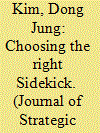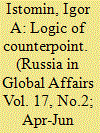| Srl | Item |
| 1 |
ID:
148224


|
|
|
|
|
| Summary/Abstract |
Scholars and practitioners of grand strategy agree that the use of military force should be supplemented by appropriate economic policies. However, strangely few accounts of economic complements to military grand strategies have been presented in recent discourse on US grand strategy. This paper takes a first step to fill this information gap. I first assess the role that could be played by economic measures under two types of grand strategies – one focusing on the balance of power and the other emphasising influence and order. Second, I introduce what I call ‘the influence-capability dilemma’ and discuss tradeoffs in adopting certain economic policies in order to help the US sustain pre-eminence in the international system. Third, I discuss how the US should address this dilemma of economic means in dealing with the rising China.
|
|
|
|
|
|
|
|
|
|
|
|
|
|
|
|
| 2 |
ID:
167616


|
|
|
|
|
| Summary/Abstract |
Permanent world peace is beginning to emerge. States with developed market-oriented economies have foremost interests in the principle of self-determination of all states as the foundation for a robust global marketplace. War among these states, even making preparations for war, is not possible, because they are in a natural alliance to preserve and protect the global order. Among other states, weaker powers, fearing those that are stronger, tend to bandwagon with the relatively benign market-oriented powers. The result is a powerful liberal global hierarchy that is unwittingly, but systematically, buttressing states' embrace of market norms and values, moving the world toward perpetual peace. Analysis of voting preferences of members of the United Nations General Assembly from 1946 to 2010 corroborates the influence of the liberal global hierarchy: states with weak internal markets tend to disagree with the foreign policy preferences of the largest market power (i.e., the United States), but more so if they have stronger rather than weaker military and economic capabilities. Market-oriented states, in contrast, align with the market leader regardless of their capabilities. Barring some dark force that brings about the collapse of the global economy (such as climate change), the world is now in the endgame of a five-century-long trajectory toward permanent peace and prosperity.
|
|
|
|
|
|
|
|
|
|
|
|
|
|
|
|
| 3 |
ID:
167769


|
|
|
|
|
| Summary/Abstract |
Since the 2000s, the drive towards normative hegemony of liberalism promoted by the United States has contributed to the consolidation of new alignments on the international arena. As it posed an ideological threat to other systems of rule, American policy prompted some states towards balance by encouraging them to strengthen cooperation between themselves. This pattern of behavior is typical of any political belief system claiming to provide universally applicable solutions for building political order in societies.
|
|
|
|
|
|
|
|
|
|
|
|
|
|
|
|